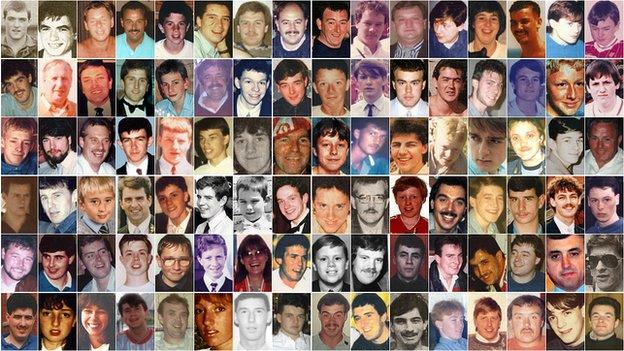Hillsborough officer 'disturbed' to hear of 'altered police accounts'
- Published

Ninety-six football fans died as a result of the crush at Hillsborough stadium in Sheffield
The officer leading the police investigation into Hillsborough was "extremely disturbed" when he first heard police accounts of the disaster had been changed, inquests have heard.
Mervyn Jones was an assistant chief constable at West Midlands Police whose team supported the public inquiry.
Mr Jones said he did not know officers' statements had been changed until a week after the inquiry began.
A detective said he was told to remove criticism of South Yorkshire Police.
Ninety-six Liverpool fans were fatally crushed in the Hillsborough stadium in Sheffield on 15 April 1989.
The following week the government announced a public inquiry into the disaster, chaired by Lord Justice Taylor. It asked West Midlands Police to run the investigation.
Mr Jones led the police inquiry team, which at its height had 432 officers working on it.
South Yorkshire Police (SYP) asked its officers to write self-taken accounts of what they had experienced on the day, which they expected would remain confidential and only be seen by its legal team.
But Mr Jones asked for the recollections to be sent to his team to avoid the need to interview hundreds of officers who had been involved.
The jury at the new inquests in Warrington, Cheshire, has heard how SYP had the statements reviewed by lawyers and amended by a police team before sending them off to the West Midlands team.
Mr Jones told the court the first he heard about that process was on 23 May 1989, around a week after the public inquiry had started to hear evidence.
'Quite relaxed'
A detective reported to him that he had received an anonymous phone call from someone claiming to be an SYP officer.
The caller told the detective that his statement had been "altered during the vetting procedure" and he and some of his colleagues were concerned at what was happening.
Mr Jones told the jury: "I was extremely disturbed. As I recall... I went to see Andrew Collins QC [counsel to the Taylor Inquiry] and others, to acquaint them with what had been said.
"I was extremely concerned that this was something that I thought was inappropriate and should not be taking place."
Mr Jones said inquiry lawyers were "quite relaxed" about what he told them of the anonymous call.
The accounts officers had given were "not statements under caution", he said, and the lawyers told him "what matters is what will be said in the hearings before Lord Justice Taylor".
'Accepted procedure'
He added: "I don't think there was any feeling that there was a potential miscarriage of justice going on at that point because they were recollections that were being presented, not statements of witnesses."
Mr Jones also said he had a conversation with South Yorkshire's chief constable Peter Wright about the phone call.
Mr Wright, he said, was "short to the point of being abrupt" and was "not in the mood to discuss it any further".
A letter that Mr Jones wrote to Mr Wright about it went unanswered.
The jury also heard how the officer who had reported the anonymous phone call to Mr Jones wrote in a memo he had told the caller that the review and amendment of SYP statements was an "accepted procedure".
Mr Jones said "that was not the policy of West Midlands Police in relation to South Yorkshire Police" and that it was not an explanation "I would have expected he would have made".
Former Det Ch Insp Alan Foster, who was working in SYP headquarters in April and May 1989, also gave evidence.
Ch Supt Don Denton asked him to join the team amending the accounts.
In his police statement Mr Foster recalled being shown a document outlining police legal advice.
He said that the document listed the "features" which were "non-evidential", including "officers' opinions, speculations, expressions of emotions and personal feelings, and criticisms of individual senior officers and the police organisation".
Nick Brown, a barrister representing 75 of the families whose relatives died in the disaster, asked: "As far as you understood them, your instructions were to remove anything from those accounts which amounted to criticism of individual senior officers or of the police organisation - the police and the policing generally at Hillsborough - correct?"
Mr Foster said: "All I was trying to do was accord with the legal advice I was given."
The inquests are due to resume on Tuesday

Who were the 96 victims?

BBC News: Profiles of all those who died
